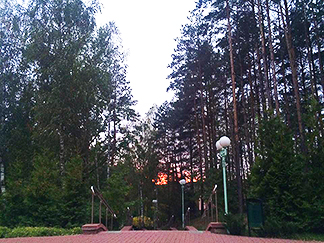
Timetable
1 day.
2 day.
3 day.
4 day.
5 day.
6 day.
7 day.
8 day.
9 day.
10 day.
Examples of Dissemination
PR Tools for a Good Reputation
-
The training course “PR tools for a good reputation” took place in Minsk, Belarus in September 2016.
- • To get participants familiar with the meaning, development and the main components of Public Relations.
- • To provide participants with the opportunity to exchange experience in the fields of PR.
- • To provide participants with practical tools and methods on how to develop and sustain PR strategy.
- • To develop the essential PR skills at participants needed for effective communication with target audiences and sustainability of their PR-strategies.
- • To explore PR ways of reaching young people with fewer opportunities including refugees, asylum seekers and migrants, promoting fundamental values of our society among them and enhancing media literacy, critical thinking and sense of initiative of young people.
- • To promote diversity, intercultural and interreligious dialogue, common values of freedom, tolerance and respect among the participants.
The participants from 9 partner organisations participated in the training. They represented the following countries: United Kingdom, Belarus, Latvia, Estonia, Ukraine, Romania and Moldova.
The training course ‘PR tools for a good reputation’ was developed for youth workers in order to explore public relations as one of the most effective instruments to build successful communication strategy of a company.
Overall aim of the project was to discover the Public Relations sphere, to learn the process of building communication
between NGO and its target groups in order to build up a positive image and reputation of an organisation and to find out the
most effective ways for promotion of NGOs and their activities.
The project was developed for youth NGOs’ workers and activists in order to equip them with the practical PR tools that they can use for their organisation if there is no possibility to employ a PR-specialist.
The training course helped the participants to understand and learn deeper Public Relations and provided space to exchange experience in this field.
The programme was designed in accordance with the objectives and the identified needs of participants. During the life of the project , the programme was continuously (or further) adapted according to participants’ needs, expectations and the evaluation of activity.
The programme was based on principles of non-formal and informal education, and use participatory techniques/tools that lead to more effective programmes.
During the activity stage, the following topics were covered: practical and theoretic knowledge about PR, PR strategy and its planning, tools, social media management, crowdsourcing, sponsorship, partnership with business companies, writing press-release, knowledge about communication with media-workers, PR experience of other NGOs.
The material have been adjusted to the participants’ interest and had a practical focus of development of the PR strategies for their organisations.
In term of intercultural awareness and skills, all participants enhanced their knowledge about Belarus and its capital Minsk as well as about cultures of the participants involved.
It was achieved by personal contacts with the participants from different countries, organised intercultural evenings, and tasting traditional food. Belarus is unknown closed country, and for the vast majority of the participants this experience was as opening a new world, which is unique and very interesting.
The project was developed for youth NGOs’ workers and activists in order to equip them with the practical PR tools that they can use for their organisation if there is no possibility to employ a PR-specialist.
The training course helped the participants to understand and learn deeper Public Relations and provided space to exchange experience in this field.
The objectives of the training course were:
The programme was designed in accordance with the objectives and the identified needs of participants. During the life of the project , the programme was continuously (or further) adapted according to participants’ needs, expectations and the evaluation of activity.
The programme was based on principles of non-formal and informal education, and use participatory techniques/tools that lead to more effective programmes.
During the activity stage, the following topics were covered: practical and theoretic knowledge about PR, PR strategy and its planning, tools, social media management, crowdsourcing, sponsorship, partnership with business companies, writing press-release, knowledge about communication with media-workers, PR experience of other NGOs.
The material have been adjusted to the participants’ interest and had a practical focus of development of the PR strategies for their organisations.
In term of intercultural awareness and skills, all participants enhanced their knowledge about Belarus and its capital Minsk as well as about cultures of the participants involved.
It was achieved by personal contacts with the participants from different countries, organised intercultural evenings, and tasting traditional food. Belarus is unknown closed country, and for the vast majority of the participants this experience was as opening a new world, which is unique and very interesting.
Methods used:
Combination of methodology sessions -presentations, debate, simulation exercises , case studies, practical activities in the field, etc.Would you like to see more?
Follow us on YouTube! Amber Initiatives YouTube Channel.
How to Apply?
POSSIBLE ERASMUS+ FUNDING
Erasmus+ Mobility project for school education staff under Key Action 1 (staff training) follow the link here: follow the link here: Opportunities for staff
Who can take part?
Staff in charge of school education(teaching and non-teaching, including school managers, heads, etc.), working in the sending school(s)as well as other educational staff (school inspectors, school counsellors, pedagogical advisors, psychologists, etc.) involved in the strategic development of the sending school(s).
Eligible countries:
All EU countries and former Yugoslav, Liechtenstein, Switzerland, Republic of Macedonia, Norway, Turkey and Iceland).When & How to apply:
Applicants (any organisation working in adult education field) have to submit their grant application by2 February at 12:00 (midday Brussels time).

Please, do not hesitate to contact us if your school would like to take part in the proposed trainings. Send your express of interest email to:
euamberinitiatives@googlemail.com

.png)
.png)
.jpg)